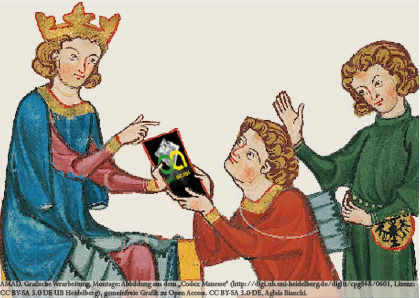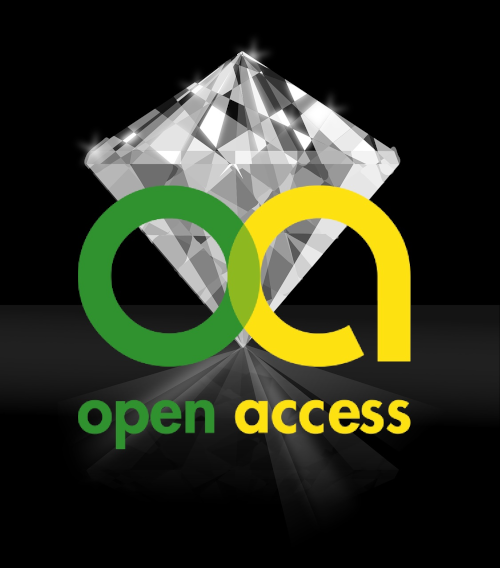AMAD
„Archivum Medii Aevi Digitale - Interdisziplinäres Open-Access-Fachrepositorium und Wissenschaftsblog für Mittelalterforschung‟Zur Einreichung

Langanzeige der Metadaten
| DC Element | Wert | Sprache |
|---|---|---|
| Autor*in | Zeitler, Doris-Andrea | - |
| Datum | 2014 | - |
| Quelle | http://othes.univie.ac.at/33090/ | - |
| URI | https://www.amad.org/jspui/handle/123456789/68744 | - |
| Beschreibung | Die vorliegende Arbeit behandelt den mündlichen und den schriftlichen Dialog. Anhand einer exemplarische Untersuchung an frühmittelalterlichen Quellen, vor allem aus dem Bereich der Historiographie und der Hagiographie, geht es sowohl um Fragen der menschlichen Interaktion, in erster Linie sprachlicher Art, als auch um Zugänge zum modernen, bewusst gestalteten Dialog. Es wird versucht darzustellen, wie im frühen Mittelalter sprachliche Kommunikation in den Quellen beschrieben oder in direkter beziehungsweise indirekter Rede wiedergegeben wurde. Es steht weniger die Untersuchung der linguistische Form der Gattung Dialog im Vordergrund, sondern vielmehr die philosophische und literaturwissenschaftliche sowie ihre kritische Einordnung. Anhand verschiedener Dialoge wird die Kontinuität des Dialogs vom antiken philosophischen Dialog sokratischer Prägung über spätantike und mittelalterliche Dialogformen zum modernen Dialog mit den Veränderungen der Gattung untersucht. Schwerpunkt der Arbeit sind die ‚Dialogi‘ Gregors des Großen. Ältere aber auch neuere theoretische Ansätze werden verglichen und unterstützen methodisch die Analyse. Moderne Zugänge zum Dialog oder zur sprachlichen Interaktion werden mit den exemplarischen schriftlichen Quellen verglichen. Im Sinne des systemischen Denkens wird das historische Umfeld von Gregor dem Großen dargestellt, um die Situation aufzuzeigen in der die Dialoge entstanden sind. Entstehungskontext und der Schreibanlass der ‚Dialogi‘ werden thematisiert. So sollen in der Arbeit Aufschlüsse über die verschiedenen Möglichkeiten, und Variationen sowie Regelmäßigkeiten dialogischer Interaktion im frühen Mittelalter und der Gegenwart gewonnen werden. Es soll aufgezeigt werden, dass der Dialog von der Antike bis heute bestand und besteht. Er hatte und hat die rechtmäßige Aufgabe der Wahrheitssuche und Wahrheitsvermittlung und war und ist ein beliebtes und vielversprechendes Mittel zur Förderung von Kommunikation und kollektivem Denken. ; The purpose of the paper at hand is to investigate oral and written dialogue. Utilizing the results of an investigation of early medieval sources, particularly from the fields of historiography and hagiography, it deals with questions concerning human interaction, mainly of the the spoken kind, as well as with the modern deliberately designed dialogue. The aim is to show how sources described verbal communication in the early middle ages and reproduced it in direct or indirect speech. However, the dissertation focuses less on analysing the linguistic form of dialogue, but rather on its philosophical facets and the aspects of literature, as well as on the critical classification of dialogue itself. Taking into account several writings, the dialogue‘s path from the antique philosophical dialogue based on Sokrates, to that in Late Antiquity and Middle Ages, up to the modern dialogue, is analysed with all its changes in the genre. The emphasis lies on the ‚Dialogi‘ of Gregory the Great. Comparisons between older and newer theoretical approaches are drawn and methodically support the analysis. Using the methods of systemic thinking the historical environment of Gregory the Great is presented to shed light on the circumstances promoting the development of dialogue. Furthermore, the issue of context and motive for writing the ‚Dialogi‘ is being broached. In the light of its results the paper should provide information about the different ways and variations, as well as the regularity of interaction using dialogue in early Middle Ages and Present or rather demonstrate its existence from the Antique up until now. It had and will always have the legitimate purpose of searching and conveying truth, apart from being a promising tool to foster communication and collective thinking. | - |
| Format | - | |
| Sprache | unknown | - |
| Rechte | All rights reserved | - |
| Schlagwörter | 05.02 Kommunikationstheorie | - |
| Schlagwörter | schriftlicher Dialog / mündlicher Dialog / Gregor der Große / Frühmittelalter / Dialogi / Kontinuität des Dialogs | - |
| Schlagwörter | 15.31 Frühes Mittelalter | - |
| Schlagwörter | 15.01 Historiographie | - |
| Schlagwörter | oral dialogue / written dialogue / Gregory the Great / Early Middle Ages / Dialogi / continuity of dialogue | - |
| Dewey-Dezimalklassifikation | 940 | - |
| Titel | Interaktion und Dialog in Quellen des Frühmittelalters | - |
| Typ | NonPeerReviewed | - |
| Typ | Hochschulschrift | - |
| AMAD ID | 521375 | - |
| Jahr | 2014 | - |
| Open Access | 2 | - |
| Enthalten in den Sammlungen: | BASE (Bielefeld Academic Search Engine) General history of Europe | |
Dateien zu dieser Ressource:
Es gibt keine Dateien zu dieser Ressource.
Alle Ressourcen in diesem Repository sind urheberrechtlich geschützt, soweit nicht anderweitig angezeigt.

